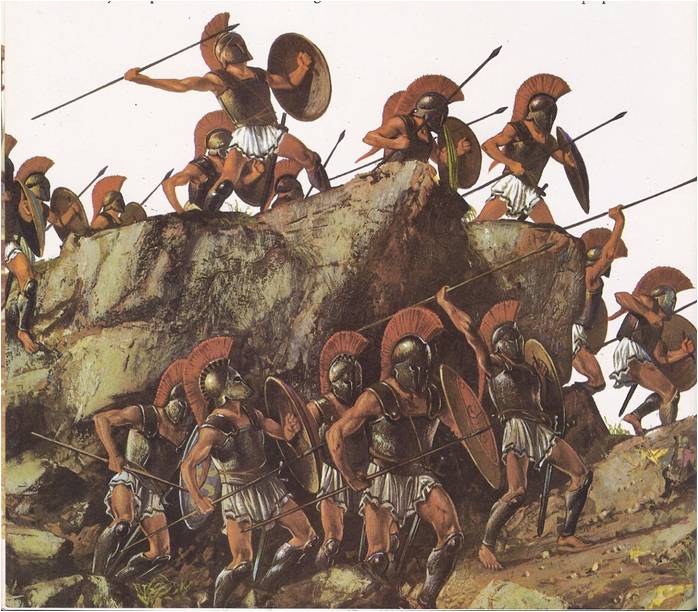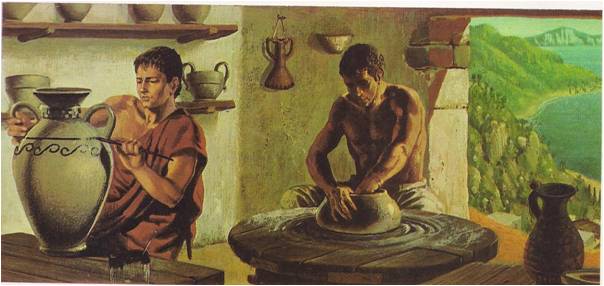In the last years of the fourth century B. C., Greek citizens going about their business in the stoas or the shops sometimes stopped and wondered what was wrong. Everything seems strange. They themselves had not changed and their cities looked the same as before, but the world around them was so different that they could hardly recognize themselves. The little poleis on the mainland looked out at an enormous empire, which stretched across Asia and Egypt. They shipped their olive oil and pottery across the Mediterranean. Their corn came from fields beside the Black Sea and the Nile. Merchants …
Read More »Ancient Greece 3000 B.C. – 323 B.C.
The Conquerors 343 B. C. – 323 B. C.
In 343 B. C., the philosopher Aristotle left the quiet of his study and journeyed to Macedonia, a country in the mountain wilderness north of Greece. He had been hired to tutor the rowdy young son of a king. The boy, Alexander, was a yellow-haired thirteen-year-old. His manners were polite and he seemed to be clever enough, but he was wild. It was hard for him to pay attention to his studies. He much preferred galloping across the fields on his huge horse. He proudly told his new tutor that he had tamed the horse himself. When he did come …
Read More »The Greek Way of Life 700 B. C. – 343 B. C.
In the first years of Spartan peace, Greece was filled with wandering soldiers. Their little cities needed them no more. The new governments, which Spartans appointed, looked on them as men who might make trouble and were quick to get rid of them. Homeless and with no way to earn a living, the old campaigners roamed from place to place. They became soldiers of fortune, men who fought for any general or city that offered pay and three meals a day. In 401 B. C., ten thousand of them hired themselves out to Cyrus, a prince of Persia, who hoped …
Read More »Greek Against Greek 430 B. C. – 404 B. C.
About 425 B. C., a lonely man, in a country that was not his own, sat down to write the story of a war that had begun six years before. Thucydides, an Athenian, had fought in the war’s first battles. He had been a general, in command of thousands of his city’s troops. Then he was ordered to go to the aid of another commander whose men were outnumbered. When he arrived, the battle had already been fought and lost. It was not his fault but the people of Athens were too anxious about the war to consider that. They …
Read More »The Golden Age of Athens 480 B. C. to 430 B. C.
When Themistocles and the people of Athens came home from Salamis, they found only the ashes of a city. Their houses and shops were gone. The Acropolis was littered with chunks of broken limestone and smoke-blackened statues, the ruins of their sacred temples. The years of war had taught the Athenians courage and victory gave them pride and hope. They began to build again. While the citizens planned new houses, Themistocles planned new walls – walls around the city, walls to protect the harbour at Piraeus and walls along the four miles of road that connected the two. When they …
Read More »Greece Fights for its Life 499 B. C.-479 B. C.
Across the Aegean, from the oriental court of King Darius of Persia, came messengers to all the city-states of mainland Greece. Their words were smooth, their smiles like sneers and they demanded gifts for their master – earth and water, the ancient tokens of tribute and surrender. The Greeks in Asia Minor already knew the Persians – too well; once the smiling messengers had come to the cities. After the messengers, the soldiers came, attacking the little poleis, one by one, until all of them were taken. Nothing could stop the Persian armies. From the capital, deep in Asia, they …
Read More »Sparta: City of Soldiers B. C. 700 – 500
In Sparta, the shops in the market place had little gold or jewelry to sell and no fine furniture at all. The people in the streets were not well dressed. Even the temples, although big, were plain and there was little in Sparta to show that this was the strongest polis in Greece. Sparta was old fashioned and proud of it. The polis had begun as a kingdom and it stayed a kingdom. The only change its citizens made in more than 400 years was to have two kings instead of one. Each kept a watchful eye on the other …
Read More »Athens: City of Wisdom and War 700 B. C. to 500 B. C.
Of all the city-states in Greece, Athens was the most fortunate. The city’s guardian was Athena, the goddess of war and wisdom. Indeed, the Athenians did well in war and were blessed with wisdom. In the dark days, when barbaric invaders had conquered one city after another, Athens had not surrendered. Later, when Athens felt the growing pains that brought civil war and ruin to so many city-states, a series of wise men guided Athenians safely through their troubles. The right leaders always seemed to come along at the right time. It was more than good luck, ofcourse. The Athenians …
Read More »Kings, Tyrants and Democracy 1000 B. C. to 100 B. C.
During the Dark Ages, the large kingdoms of Homer’s Achaean heroes had disappeared. The Greek world was now dotted with dozens of little countries. They had begun with fortresses set on hills and crags. Soon each fortress was surrounded by a village, as farmers abandoned their huts in the fields and built new homes close to the walls. In times of danger, they could take refuge behind the walls. A market place was built and a few metalsmiths and potters opened shops. When temples were set up inside the fortress, the castle hill became an acropolis, a “high town,” the …
Read More »Gods and Heroes 800 B.C. – 550 B.C.
From island to island and town to town, across the wide new world of the Greeks, the minstrel wandered, with a harp slung across his back and a batch of stories in his hand. When he knocked at the gate of a palace or great house and offered to sing for his supper, he was never refused. There were no shows to see and no books to read. The people relied on the minstrels to entertain them and to tell their stories of the past, which otherwise might be forgotten. The minstrel’s stock of stories was a mixture of tall …
Read More »








